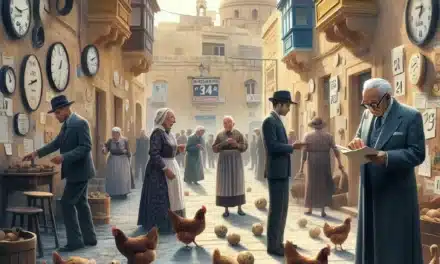The Unexpected Patron Saint of Paceville
When Mdina Met Modernity
It was a day like no other in the quiet, ancient streets of Mdina. The silent city was buzzing with an odd kind of chatter that morning, and it wasn’t just the usual tourists asking for directions to the nearest pastizzeria. No, this was something else entirely. Renowned for its timeless beauty and serene atmosphere, Mdina was about to witness an event so bizarre, it would make the Ħaġar Qim temples look like a new development.
An Ħobż Biż-Żejt Heist Gone Wrong
Enter Wistin, a local Maltese man with a heart almost as big as his belly, known throughout Sliema for his legendary appetite for ħobż biż-żejt, stuffat tal-fenek (rabbit stew), and a good laugh. Wistin got the shock of his life when his favorite snack went missing on the eve of the annual ‘Festa tal-Ħobż.’ Desperate and snack-deprived, Wistin embarked on a comical quest to find the culprit, his beloved sandwich wrapped in local gossip and mystique.
Paceville’s Unlikely Messiah
Meanwhile, in the neon-glazed streets of Paceville, a peculiar statue had begun turning heads. Locals and party-goers squinted curiously at the figure dressed remarkably like Wistin, holding not a saintly scepter but a bitten-into ħobż biż-žejt. It was uncanny – the statue had Wistin’s trademark mustache, and his expression was a mix of mild confusion and hunger-induced determination.
A Twist of Fate: The Interview that Shook Gozo
“I swear by the Ggantija temples, I didn’t commission a statue of myself! And who would want to immortalize the half-eaten sandwich anyway?” Wistin exclaimed in an interview with Times of Mela. “Mela, I just wanted my lunch back, uwejja!”
Rumors swirled like a Qawra whirlpool. Had Wistin somehow become the unofficial patron saint of revelers and snack-lovers alike? Perhaps it was a sign – food theft was no longer merely a petty crime; it had become a cultural crisis.
Uncovering the Crumb Trail
As the plot thickened like the sauce in a good rabbit stew, a group of expats in Malta – led by a certain adventurer named Ben – took up the challenge to unravel the truth behind the mysteriously delicious statue. With each city providing a breadcrumb, from Valletta’s majestic walls to Gozo’s azure window (rest in peace), they nibbled their way through clues, hilariously misconstruing Maltese customs at every turn.
The Great Revelations
It turned out that the statute was the work of a mischievous local artist named Kikku, whose penchant for pastizzi had ignited a fervent, artistic crusade against food thieves. Kikku had watched Wistin from afar, empathizing with his snack-related sorrows and had decided to stand in solidarity – quite literally – with a statue capturing the heart (and stomach) of Maltese society.
Għażiż Wistin: A National Hero
In a twist no one saw coming, the statue became an overnight sensation. Wistin, now hailed as a charming folk hero, gave reluctant interviews, insisting he was just a man who wanted his lunch back. Nonetheless, his unlikely journey sparked a national campaign against the trifling issue of food theft, labeled “Il-Kampanja kontra s-Serq tal-Ikla.”
A Feast to Remember
To celebrate the resolution of this peculiar tale, the residents of Mdina hosted a grand feast, inviting Wistin to be the guest of honor. So there he sat, at the head of the table, surrounded by mountains of ħobż biż-żejt, pastizzi, and, of course, rabbit stew – symbolically representing the unity of Maltese culture: full of flavor and unexpected twists.
“Kollox sew, as long as my food is safe,” Wistin chuckled to Times of Mela, his mustache glistening with olive oil under the Mediterranean sun. “Uwejja, let’s eat. Our culture – and my appetite – waits for no one!”
And with that, the silent city roared with laughter, clinking of glasses filled with Kinnie, and the warmth of a feast that would go down in the annals of Maltese folklore. The Times of Mela had never before chronicled an adventure so enriching, so endearing – a true homage to the spirit of Malta and her beloved people.







Recent Comments